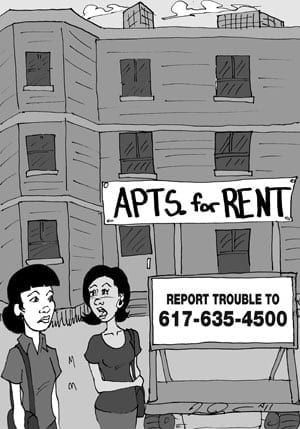
An end to irresponsibility
Several generations ago the standards for decorous public behavior were far more stringent than they are today. People were expected to address elders, and even strangers, with respect. Foul language was rarely heard in the streets. Proper dress was expected for various occasions. For example, going downtown, even for shopping, called for business attire.
Of course there was no way of knowing what might take place behind closed doors. However, there was an expectation that every landlord would maintain an “orderly house.” There would rarely be the necessity to call for police intervention.
Mayor Tom Menino recognizes that the “orderly house” standard has been allowed to deteriorate. There are some properties that are frequently the site of crime and violence. Some landlords have not assumed responsibility for the conduct of their tenants. Therefore, Mayor Menino has established the “problem properties task force” that will enable the Boston Police Department to provide special surveillance to those locations and the landlords will be billed for the costs.
Such residential disorderliness rarely occurs in high income neighborhoods. Working class families have to endure excessive disruption where they are trying to provide a peaceful environment in which to raise their children.
The mayor’s program is a needed and useful strategy to eliminate the safe havens for miscreants.
Another step toward equality
Democratic countries assert that their citizens enjoy equal justice before the law. However, that is more of an affirmation than a reality. The affluent who can afford expensive legal counsel are likely to have a better quality of legal representation than the indigent.
That disparity cannot be readily corrected. Some citizens are wealthier than others, but policymakers should take every other opportunity to maintain equality in the courts. No one should feel like a second class citizen before the law.
For some time African Americans have felt victimized by the disparity in the punishment for illegal cocaine possession. It was not necessary to be a drug addict to be offended. Many law abiding blacks suffered from the blatant racial discrimination.
Last year before the Fair Sentencing Act took effect, a drug dealer arrested with 50 grams of crack would receive a mandatory 10 years in federal prison. It would require 100 times as much powder cocaine to receive the same sentence. Crack was a product used primarily by blacks while powder cocaine was usually for whites. Since both forms are destructive and addicting, there is no medical reason to prosecute blacks more severely.
The Fair Sentencing Act of 2010 reduced the mandatory sentencing ratio from 100-to-1 to 18-to-1. Possession of 28 grams is now needed for a five-year mandatory sentence and 280 grams are needed for the 10 year sentence. And last month the U.S. Sentencing Commission voted to make the reforms retroactive.
The Commission’s vote acknowledges the unfairness of the sentencing. African Americans are indeed pleased with the vote. However, there is still no justifiable rationale for maintaining the 18-to-1 sentencing differential.






